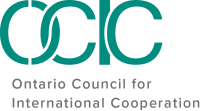REVISIONS TO THE GAC CSO PARTNERSHIP POLICY – CCIC KEY MESSAGES
- The principal goal of this Policy, and its implementation, should be to create an environment that is as conducive as possible to fostering a strong and vibrant civil society at home and overseas. This should include efforts to a) support and build the capacity of a diversity of civil society organizations (CSOs) to realize their full potential; b) facilitate the multiple roles that civil society plays; and c) maximize the impact CSOs have in development and humanitarian assistance to deliver on the Sustainable Development Goals (SDGs), the Grand Bargain, and Canada’s new Feminist International Assistance Policy (FIAP). This will require a policy that embodies a new and equitable partnership between Global Affairs Canada and civil society and that supports CSOs as independent development and humanitarian actors in their own right.
- The Istanbul Principles for CSO Development Effectiveness, and Humanitarian Principles must be central elements of the new Policy’s Guiding Principles and Commitments. Both sets of Principles have implications for what civil society values, how it works, and how governments can support this work. These implications must be integrated into the Policy, the objectives, corresponding actions and implementation plan.
- In line with the principal goal outlined above (see 1 above), the Policy should take specific steps to create an enabling environment for CSO partners in Canada and overseas, in particular for human rights defenders and women’s rights organizations. This should include by a) promoting rights, legislation, and policy measures that are supportive of a diverse and vibrant civil society; b) establishing timely, responsive, predictable, and flexible funding mechanisms appropriate to the diversity of CSOs with which GAC works; and c) establishing institutionalized and iterative dialogue, including of a multi-stakeholder nature, between the government and civil society as equal partners.
- Each objective of the Policy should clearly articulate how it, and the corresponding actions, will advance the overall vision and goal of the Policy (see 1 above). Furthermore, all objectives should be coherent with the intersectional, feminist, and human rights-based approaches of the FIAP (as well as the SDGs and the Grand Bargain), while respecting additional areas where specific needs and priorities are identified by civil society and require separate attention and action. For their part, each action should be goal-oriented and include specific, measurable, achievable, relevant, and time-bound (SMART) commitments from government.
- Implementation will be critical to the success of this Policy – and to the success of other Canadian international assistance policies, programs, and efforts. In the spirit of partnership, the government should meaningfully engage civil society as equal partners in all stages of implementation – including in translating the Policy into practice. This should include meeting periodically to evaluate and review the Policy’s action plan, drawing on CSO experience and lessons learned.





